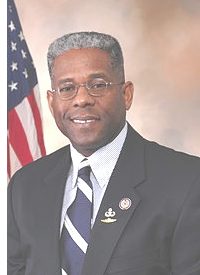
Few, if any, understand what is happening in Afghanistan and Pakistan better than Republican Congressman and retired Army veteran Allen West of Florida (photo, left). In a speech Tuesday to the Heritage Foundation, he declared:
We don’t need Pakistan to be successful, but as long as you continue to let them believe that you need them, they’re going to play you like a bad fiddle and that’s exactly what’s happening…
I was one of the first guys who came out and said that we do need to cut off this funding to Pakistan. Look, I spent two and a half years in Kandahar [Afghanistan], and any time we put pressure on the Taliban, they went to Pakistan. Now there’s a reason why all of a sudden these groups are finding sanctuary there. They feel that they’re not going to be bothered too much … In that part of the word, it’s very simple. People understand one thing — strength. They don’t understand compromise. They don’t understand negotiations. They definitely don’t respect appeasement.
The problem is that the U.S. military is already seriously overstretched. There is no way that the U.S. could occupy or control significant parts of Pakistan — a large, populous country — without a great deal more money and troops. If the Taliban continues to hide there, and if the Pakistani government winks at that sanctuary, then the entire U.S. mission in Central Asia seems futile. Given the bottomless pit which is the national debt, plus the complications of Asia in many different ways, it would appear that America’s mission in Afghanistan has little hope of ultimate success.
The complexities of the Hindu Kush (the 500-mile mountain range stretching between Afghanistan and Pakistan), the Iranian plain, and the Indian Ocean basin are reflected in much more than just the religious differences of Muslims, Christians, and Hindus. Although most Americans do not know it, nearly all the nations in this part of the world have many different languages, tribes, and religions within each of their nation-states. India, for example, is a vast subcontinent in which the Dravidians of the south and the Aryans of the north scarcely see each other as countrymen. The Dalits, or “Untouchables” of India have a population roughly equal to that of France. The subcontinent has been the birthplace of several metaphysical systems — Buddhism, Hinduism, Jainism, Sikhism, and others — and is home to most of the world’s Zoroastrians.
How contorted can civil wars be in that part of the world? Consider that in Sri Lanka (formerly Ceylon) the two dominant religions are Hinduism and Buddhism. Westerners have been led to believe that both are metaphysical systems of nonviolence. Yet, in many ways, the worst civil war of the last few decades has been fought between devout Hindus and pious Buddhists, who each poured gasoline on the other and set them on fire — or, in the case of the Tamil Tigers, pioneered the “suicide bomber” technique later adopted by Muslims. What brought peace to Sri Lanka? Not American troops or peacekeepers or mediation. India, in fact, played a much stronger role as a mediator. But ultimately the Sinhalese and the Tamils tired of slaughtering each other. Even so, there is still no peace. Only yesterday, videotaped evidence surfaced of atrocities committed against the Tamils.
If Sri Lanka — a small island nation isolated from the rest of the world except for India, without religions mired in the Jihadist thinking of Islam, and lacking the ancient and bitter rivalries between the Mogul Muslim rulers of India and its Hindu subjects — cannot find peace, then how likely is it that Pakistan can? Across the eastern part of the subcontinent, the Bengali people of India just voted out the Communist Party, which had ruled the province for decades. To the north in Nepal, a Maoist Communist Party competes with other Communist parties for power, and the country has yet to form a government.
There is a sad tale of the Old World, and it stretches from Japan (where even acknowledgement of the grotesque crimes committed against the Chinese people draws rebukes) to Africa (where dictators for life such as Gadhafi kill their own subjects), to the militant atheism which is much of modern Europe.
Can U.S. soldiers ever make peace and so end terror and oppression in this hemisphere of Hitler, Stalin, and Mao? Or is it their business to attempt to do so? No; all we can do is to show the world how a peaceful and free people live. Our foreign policy should be that of our Founders, so clearly delineated by John Quincy Adams. He said of America:
She has abstained from interference in the concerns of others, even when conflict has been for principles to which she clings, as to the last vital drop that visits the heart.
She has seen that probably for centuries to come, all the contests of that Aceldama the European world, will be contests of inveterate power, and emerging right.
Wherever the standard of freedom and independence has been or shall be unfurled, there will her heart, her benedictions and her prayers be.
But she goes not abroad in search of monsters to destroy. She is the well-wisher to the freedom and independence of all. She is the champion and vindicator only of her own.



